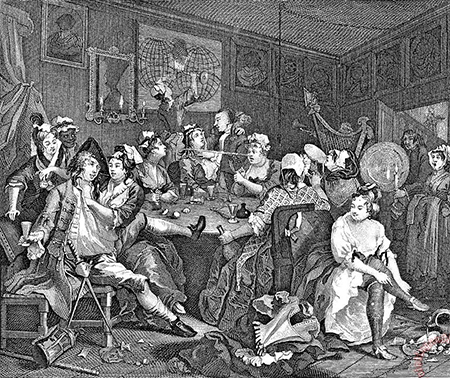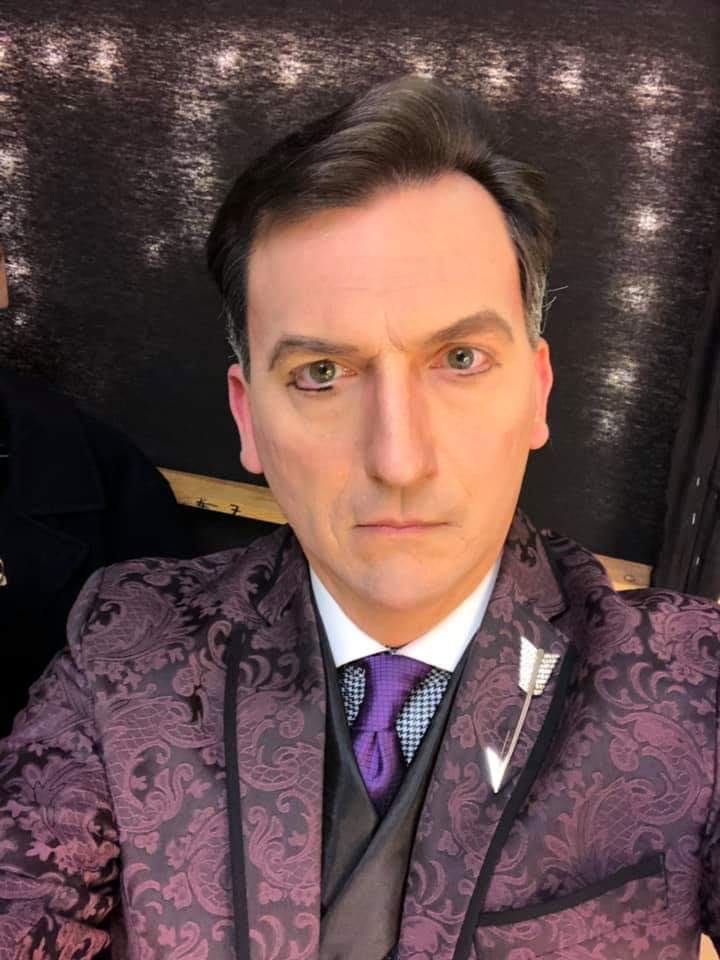by Daniel Hathaway and Mike Telin

On Thursday, March 21 at 7:30 pm at the Klais Drama Center, Baldwin Wallace Opera Theater takes on this entertaining tale of Tom and his pact with the Devil. The double cast includes Ethan Burck and Benjamin Krumreig as Tom Rakewell, faculty members Benjamin Czarnota and Marc Weagraff as Nick Shadow, DeLaine Crutchfield and Giuliana Bozza as Anne Trulove, and Nan Golz and Sarah Antell as Baba the Turk. Scott Skiba directs and Domenico Boyagian conducts the Baldwin Wallace Orchestra. Performances continue on March 22 and 23 at 7:30 pm and March 24 at 2:00 pm. Tickets are available online.
We spoke with Marc Weagraff by telephone and began by asking him how it feels to play the Devil?

ClevelandClassical: What is his staging concept?
MW: It’s fairly traditional and laid out in a way that I think will be very accessible. It’s not over-conceptualized in a way that’s hard to grasp. What’s interesting about it is the use of various odd-shaped but very angular panels that are flying in and out with projections on them providing the backdrop. That creates a 21st-century, non-linear kind of attitude. It’s very imaginatively put together.
CC: Is it fun to work with your students?
MW: It’s amazing, tremendous fun. I had an opportunity to fill in a year and a half ago with Threepenny Opera for a student who needed to pull out, so our Tiger moved up to Macheath and I got to play Tiger. It’s thrilling and enlivening being surrounded by the enthusiasm and energy level of students. We learn a lot from each other.
CC: What are the opera’s vocal challenges?
MW: It’s a demanding piece musically. It’s not what I would call atonal, but it’s certainly coming from a 20th-century, advanced style of harmony. Some of the vocal lines are almost reminiscent of Bach — they’re not incredibly melodious, but it works. But some of them are very beautiful in a traditional way. Sometimes you have a Romantically- written vocal line that has an orchestra part underneath that may not have anything to do with what you’re singing. That provides some challenges.
While it’s certainly in a 20th-century idiom, its dramatic capacity is something that everybody will be able to appreciate. Once you meet the characters in the opening scene, you learn to like all of them, even Nick. He’s definitely sort of a gentleman monster. Watching the Rake’s progress from an innocent young man to where he finally ends up is something that everybody will appreciate.
CC: If you were marketing this show, what would you tell potential ticket buyers?
MW: People will love the technological juxtaposition of the projections and scenic work. And hearing the incredible young voices we have here in the BW voice performance program is something everybody could enjoy and be impressed with. There are no weaklings here, it’s a very strong cast.
It’s also really entertaining theater — you’ll laugh and you’ll cry, and that’s what we hope for in theater. The libretto is a bit poetic and that adds to the beauty of this heightened art form that we call opera theater. So many people claim to love musical theater and are intimidated by opera. What we have here is an incredible piece of theater that is also incredibly musical. Anyone who enjoys music and watching a drama play out in front of them will love this.
A senior from Rochester, New York, soprano Giuliana Bozza (pictured above in a recent BW masterclass with Jennifer Rowley) will sing the role of Anne Trulove. We began by asking her about her character.
Giuliana Bozza: It’s an interesting role, but it took me a while to connect with her because the music is very challenging, so at the beginning I only focused on that. But once we started rehearsals I really began to figure out who she is.
CC: Tell me about Anne.
GB: She’s a small town girl who wants to stay where she is and live with the love of her life. But when she is called upon to be strong she does step up to the plate, even though it is out of her comfort zone. In my first aria you already get a sense of her inner struggle.
CC: Jumping to the 3rd act, why does she return to Tom, and once she does, why does she take compassion on him and sing that beautiful lullaby?
GB: She goes because Baba the Turk tells her that Tom still loves her, so she decides not to give up, but to keep fighting for his love.
The Lullaby is my favorite scene in the entire opera. It’s heartbreaking because Anne goes to London to win back his love, but Tom is in an insane asylum, and he really isn’t Tom anymore, which is so sad.
In a way that scene is even more tragic than when he dies because he mistakes me for Venus, and he thinks he is Adonis, which proves that he does think of me as the love of his life.
CC: Do you think that audiences will be able to relate to Anne?
GB: I think it’s easy to relate to her on so many levels. Everyone goes through loss and heartbreak. And through all of the crap she has to put up with, she still remains strong.
Published on ClevelandClassical.com March 19, 2019.
Click here for a printable copy of this article




